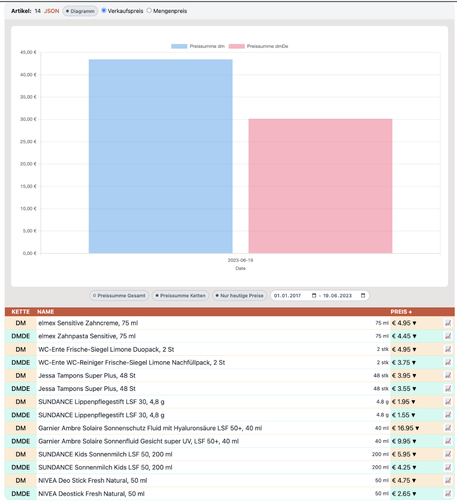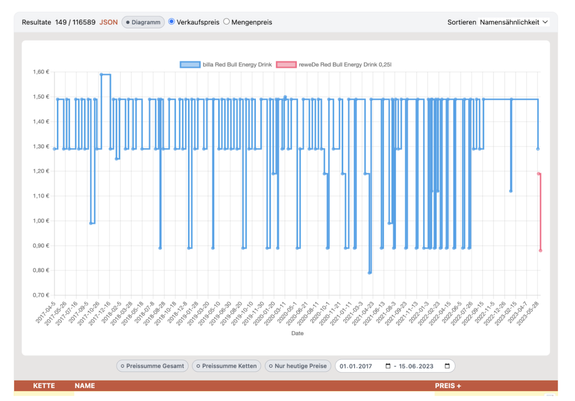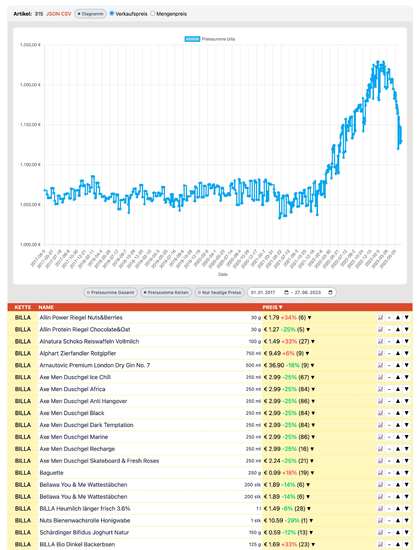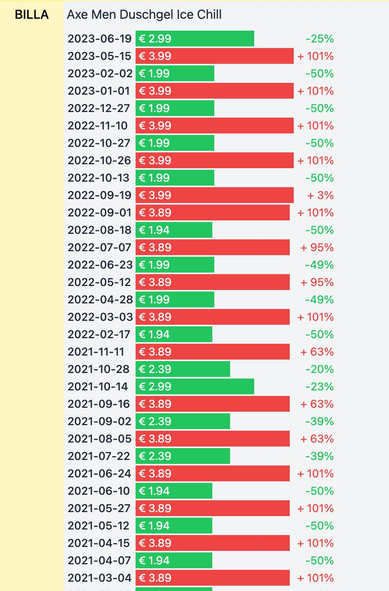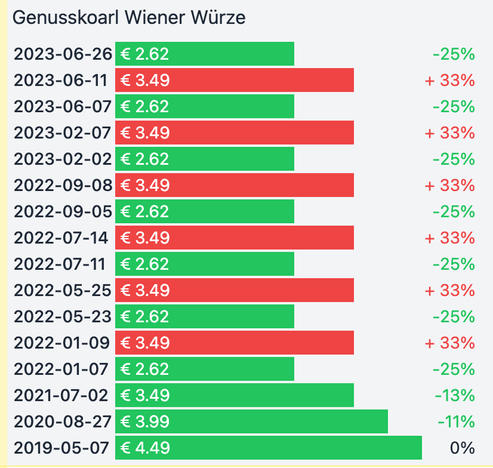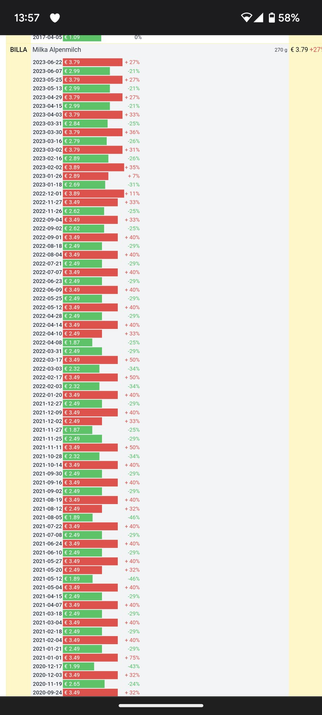We could show shrinkflation, meaning products with less content are sold for the same or even higher price.
Examplified by e.g. laundry detergent.
We could also show that the exact same product cost up to 40% less in Germany, a country with higher mean income and higher cost of living.
Even more interestingly, products exclusively produced in Austria cost less outside of Austria.
Billa is the Austrian version of REWEDE.
Even fucking Red Bull, an Austrian brand, costs more in Austria when it is discounted here, than it costs normally without discount in Germany.
WTF.
Then I looked at an aspect pretty unique to Austria: discounts.
You see, in a normal country, with a competitive grocery market, you usually have about 10%-20% of products that get discounted on average.
In Austria, that rate is 40%. It's a fantastic way to obfuscate the actual price of a product. As a customer, you'll never know what you'll pay on that day until you see the current discounts directly in the store.
The chains are very generous and will send you discount leaflets via mail.
If I were trying to describe it in more flowerly terms: It's asymmetric information war fare.
The stores tell you they are good and benevolent and only have your interest at heart, so here are discounts. Discounts for everyone. They even gamified the whole thing with stickers. I shit you not. People collect stickers they put on the products in the convery belt at the register. There's also apps, which will give them all info on you
In reality it makes it impossible to know how much things cost
Given the historical data I had, I was able to also check for patterns in the discounts they give. How often, how high.
The grocery chains got a little iffy about all that somewhat negative media coverage, some of which was spurred by my continued analyses.
They started to put out these things in the store. It basically says "We've already lowered the prices of 450 products for you this year". With a sortiment of 22000.
They were also dumb enough to put out a machine readable PDF with all the products they lowered the price for.
With a little data science magic, I was able to match those with my database...
The spot check showed that their claims were true on the surface.
But I'm a stickler for data, so I looked a bit closer.
And lo and behold. There was fun to be had.
There are products that are cyclic in their price changes. E.g. this axe shower gel, which they listed as having a lower price now.
Yeah, you lowered the price from 3.99 to 2.99. But that follows the exact pattern this product's price had over the last couple of years.
Technically correct. But not a permanent price decrease.
Second picture is another example of that.
But there's a more "nefarious" kind of price decrease.
As I said, Austria is a country of insane amounts of cyclic discounts. Many products will be sold for their "regular" price for one week and a discount price the other.
The real price for the consumer is the average of the regular and discounted price.
Given this knowledge, do you notice something with the prices for this product the grocery chain claims to have decreased the regular price on?
Of course you do, cause you are a smart cookie.
While their claim that they decreased the regular price is correct, they also increased the discounted price that comes into play every other X weeks/days.
So they are again technically correct: the regular price was decreased.
But on average, a consumer pays more if they buy the product every week, as the discounted price has been increased. The average is higher than before.
Sneaky.
All that media coverage of my platform and the platforms of other people, with whom I've started to converse and who've became friends of sorts, triggered the competition authority of Austria.
You know, the guys and gals who's job it is to sniff out anti-competitive behaviour, cartels, price gauging and coordination and so on.
They contacted all of us to ask what we'd need to continue doing our work. They actually saw value in that.
We provided them with a shit ton of feedback.
The basic gist of that feedback:
- Legal: it must be legal for us to crawl and publish the price data the stores put out on the web in their online stores
- Technical: ideally, stores would be forced to put that data out in a normalized form, so matching and comparisons become easier. We already did that ourselves though, with some data science and heuristics, so no biggie if that doesn't happen.
Besides that feedback, I also send them a shitton of data and patterns I found.
@badlogic no it's not ideal to force stores to do something. there's no market failure there.
@cshentrup @badlogic information asymmetry is a very basic market failure, from an orthodox neoliberal perspective. perfect information is an assumption of market efficiency.
@interfluidity @badlogic@mastodon.gamedev. the only relevant information for a consumer here would be the prices, which are perfectly transparent.
@cshentrup The prices are only transparent at the point of sale, and there are tremendous frictions to aggregating them across the market and over time. Price transparency, and only price transparency, is precisely what the proposal would "force".
@interfluidity That's just a bizarre use of government regulation when we have more information than we've ever had and you could easily create a website to track this stuff.
also a grocery chain that had superior price transparency could already have a competitive advantage so I still don't see a market failure.
@interfluidity as I was typing this I saw an alert from the grocery store order my wife just placed. we buy our groceries online and can either go pick them up or have them delivered for a yearly fee of $100, as long as the orders are over $30 a piece. this is better price transparency than we have had in the history of humanity.
@cshentrup convenient information from a store is not price transparency. price transparency means that consumers know all the prices across the market so they can choose among competing suppliers.
i'm glad your store offers you convenient options and tells you the prices they will charge for them! but having the price at the point of sale is very far from price transparency. (it's astonishing we have markets — e.g. health care — where we don't even have that!)
@interfluidity so being able to conveniently compare prices across countless stores from my computer is not transparency?
and creating a website where I show the average price for a basket of identical goods at 5 to 10 local grocers also doesn't count?
hmmm.
@cshentrup All that the author is asking to "force" is maintaining the technical capacity to create the latter at large grocery chains.
Not much of a coercion by the leviathan, perfectly justifiable on orthodox neoliberal grounds. Prices should be posted. Here's the public space, the inexpensive modality, by which you are to post them.
Not much of a bite by the overweening leviathan.
@interfluidity we already have every opportunity for price transparency. You could go by the same goods at three different stores and post online how much they cost.
@cshentrup that is very expensive. and prices can change frequency.
creating those kinds of market frictions is how firms undermine the perfect competition neoliberal models rely upon, discrediting them as a practical matter.
i no longer call myself a neoliberal (i might once have), but if you want to support the cause, this is exactly the sort of intervention you should support, the kind that makes some approximation of perfect competition real.
@interfluidity oh yes, average prices from store to store vary radically from day to day. sure thing man. let's get some more cookie warnings.
@cshentrup the thread we're responding to was literally about week-by-week price and sale variation strategies used by grocers. if you wanted to make a good website even for a sizable local market to capture these kinds of strategies by physical visits, it would have to be at least somebody's full-time job. yet it is to a first approximation cost free to publish them in a standard format on the firm's exiting web infrastructure.
@interfluidity I don't see how changing them week by week is going to appreciably change their RELATIVE cost. I live within cycling distance of two different whole foods, a new seasons market, a market of choice, a Fred Meyer...
Fred is always going to be the cheapest of those any week of the year. followed by market of choice followed by new seasons followed by whole foods.
@cshentrup Walmart famously cultivated a (deserved) reputation for everyday low prices, made its profits by strategically raising prices on subsets of goods, relying on the everyday low profits reputation to draw customers in who would presume these goods would be around best-price when they were not.
Fred Meyer has an opportunity with u to do the same!
Under competitive markets, relative prices certainly wld vary btw stores offering similar quality+services. (WF is a different amenities tier)
@interfluidity when it comes to any goods that are more expensive than your everyday groceries, it already pencils out to check out the prices at a few local stores. as I just did when I bought a new magnetic induction oven and television. I do not believe Austria has some kind of magical economic situation that needs special government intervention.
@cshentrup sure. price transparency is great everywhere, and we should have more government support of it here too.
@interfluidity That's stupid. there's no need for government intervention here. there's not a problem that can't be solved by the market.
@cshentrup well, we'll disagree but let's be nice about it.
i am not a neoliberal, who thinks markets should be left alone but for narrowly circumscribed failures.
i am more Polanyian these days, i think markets are polymorphic beasts that states must shape and manage to yield prosocial outcomes, and encouraging price transparency (as much with carrots as sticks) in one useful way they can do that.
@interfluidity That doesn't make sense. utility is roughly equal to log of wealth, so the correct economic policy is that which maximizes the amount of GDP and redistributes as possible without dead weight loss. this is an objective mathematical statement.
@cshentrup even more deeply than about markets, we disagree about social welfare functions and there inherent dependence on inherently neither objective nor scientific values, and about the use and authority of what purports to be objective science in social affairs.
we've debated that _ad nauseum_ before (a bit here, more on the QSite). i have little interest in picking it up again.
@interfluidity this is robustly proven via revealed preference experiments. I'm sorry but they's just not a scintilla of evidence supporting your worldview.
ask anybody walking down the street whether they would rather have 50% chance of 101 or a guarantee of 50.
@cshentrup yeah. that's the kind of move we're going to disagree about, on a variety of different levels.
@interfluidity You can't disagree about objective facts.
and you can't merely criticize my utility function, you have to propose an alternative and show how it better fits the data. You couldn't do that to save your life.
@cshentrup you don't have a utility function. utility is a construct made up as a tool to explain, summarize, and predict behavior. welfare is a normative construct, distinct from but in practice usually informed by peoples' hypotheses about utility. i am criticizing your worldview about social affairs, that your views are informed by an objective science rather than subject to the human vagaries of diverging preferences and values.
@interfluidity of course you have to have a utility function otherwise you have no basis for evaluating which of two policies is superior. You have no basis for having a conversation about policy at all at that point.
No welfare is not a normative construct. welfare is just a measure of preferences satisfied. if you would prefer chocolate to vanilla, chocolate improves your welfare more than vanilla.
there's no such thing as normative. most of your response there was word salad.
@cshentrup people debated policy long before Bentham coined the notion of "utility". the distinction between utility and welfare i described—utility is positive, a construct deployed to predict and describe—while welfare normative—about prescribing, which inherently depends upon values—is what you would learn in any welfare economics class. my salad is very popular, and its dressing is very orthodox.
(tbf, Bentham used utility normatively, and most of us slip up on the distinction often.)
@interfluidity Bentham didn't invent utility he discovered it. And I'm sure lots of people discovered it before him and just didn't write books about it. utility demonstrably exists in every action taken by any organism.



